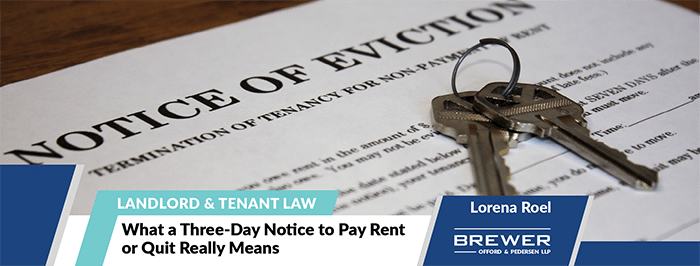It is after Labor Day weekend and that means school supplies, summer vacation credit card bills, and preparing for the holidays. With all these added costs, the tenant may not have enough money to pay rent and the landlord serves a Three-Day Notice to Pay Rent or Quit. Does a Three-Day Notice mean the tenant will be kicked out of the rental unit in three days? Short answer, not necessarily.
A landlord has the right to serve a Three-Day Notice on a tenant if the tenant has not paid rent on time. The Three-Day Notice must: 1) be in writing; 2) the title should state Three-Day Notice to Pay Rent or Quit; 3) state the name of the tenant; 4) address of the rental; 5) amount of past due rent; 6) the dates the rent was due; 7) the name, telephone number, and address of the person to whom the rent payment shall be made; and 8) shall not include other costs such as late fees, interest, utilities, property takes, etc. (Code of Civil Procedure Section 1161). The notice may also state that the landlord elects to declare a forfeiture of the lease if the tenant does not pay rent within the three days (Code of Civil Procedure Section 1161.5).
The landlord must serve the Three-Day Notice on the tenant. The landlord can serve the Three-Day Notice in the following ways: 1) by delivering a copy to the tenant personally; 2) leaving a copy with someone of suitable age and then mailing a copy to the address; or 3) by posting a copy on the front door and mailing a copy to the address (Code of Civil Procedure Section 1162).
If the Three-Day Notice does not contain the requirements as stated above and/or the Three-Day Notice is not served in accordance with Code of Civil Procedure Section 1162, then it is presumed invalid. If the Three-Day Notice is invalid, then the landlord will have to prepare and serve another Three-Day Notice before filing an Unlawful Detainer Complaint.
Let’s presume the Three-Day Notice is valid and served properly, what happens then? First, the landlord and tenant must determine when the three-day period expires. If the tenant was served on a Monday, the third day is Thursday. Therefore, the tenant must pay rent to the landlord by Thursday. Second, the tenant must pay the landlord the amount of money and in the manner stated on the Three-Day Notice. Specifically, the landlord may require payment in the form of a money order to be delivered to their home address. Lastly, the tenant should contact the landlord via email to state that they will or have delivered the rent within the three days.
If the tenant is unable to pay rent within the three days, then the tenant has the option to move out of the rental unit or stay. If the tenant remains in the rental unit past the three days, then the landlord will have to begin the Unlawful Detainer process. The landlord cannot legally lock a tenant out of the rental unit, but instead must go through the court processes in order to remove the tenant (Civil Code 789.3). A tenant can only be removed from the rental unit by the sheriffs only after the landlord obtains a writ of possession issued by the Court (Code of Civil Procedure Section 1166a).
A writ of possession is obtained after the landlord completes the Unlawful Detainer process by filing a Summons and Complaint with the Court and serving it on the tenant, and then ultimately prevailing in the unlawful detainer trial (Code of Civil Procedure Section 1166). Depending on the facts and how the tenant responds to the Complaint, the Unlawful Detainer process (including the actual removal of the tenant by the Sheriff) can take two weeks to well over a month after service of a valid Three-Day Notice.





